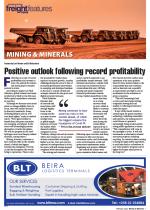If the world is to meet its 1.5°C climate-change target by 2050, the mining industry will need to reduce direct CO2emissions to zero, according to a McKinsey & Company report.Authors Henry Legge, Clemens Müller-Falcke, Tomas Nauclér and Erik Östgren say the mining industry contributes 2% to 3% of global CO2 emissions.Supply chain and transport are identified as one of three areas that miners need to focus on.The others are emissions from power generation and diesel emissions from mine equipment.Of the three, transport is estimated to contribute around 15% of CO2 emissions. This percentage varies according to the type of mining and distance from the processing plant.Electric vehicles have long been used in mining operations, both underground and open pit.Australian miner Fortescue Metals Group is investing in the technology. In January 2022, the company announced that it had purchased an engineering and battery company, founded by Williams Formula 1 team.The iron ore miner said it had been working with Williams Advanced Engineering (WAE) since early 2021 to build a prototype battery to power a 240-ton electric haul truck.There is an emphasis on rail to reduce the carbon footprint of the land leg of mineral exports and imports.An example of miners becoming rail operators is the development of the Nacala rail corridor, which runs from the Tete district of Mozambique through Malawi to the Port of Nacala. Mining companies are also moving into shipping in order to reduce their carbon footprint.On February 7, 2022, the BHP-owned LNG-fuelled M/V Mt. Tourmaline completed its first voyage between Western Australia and Singapore.BHP has chartered five LNG-fuelled Newcastlemax bulk carriers from Eastern Pacific Shipping (EPS) for five years and awarded the LNG fuel contract to Shell.The LNG-fuelled vessels were expected to reduce GHG emissions intensity by more than 30% per voyage compared to conventionally fuelled ships, contributing to BHP’s goal of reducing emissions intensity from its chartered f leet by 40% by 2030, BHP chief commercial officer Vandita Pant said in a statement. "Transport is estimated to contribute around 15% of CO2 emissions.– McKinsey & Company Report

